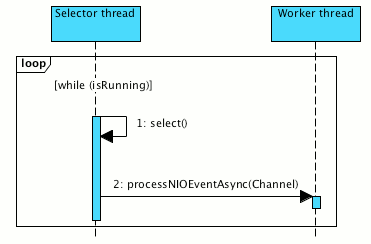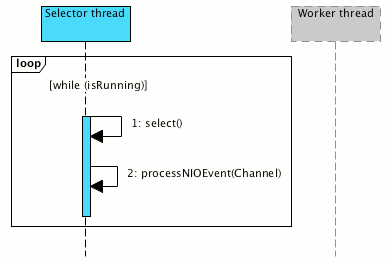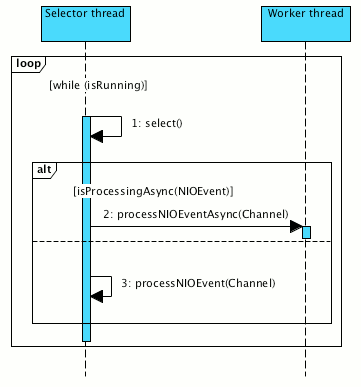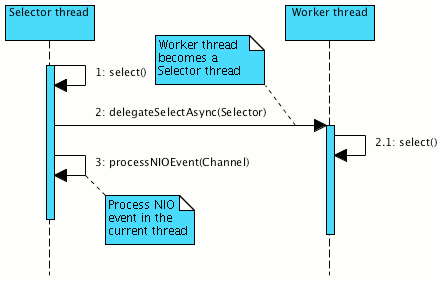IOStrategies
When working with NIO, the natural question we ask is how we’re going to process a particular NIO event, which occurred on an NIO channel. Usually we have two options: process the NIO event in the current (Selector) thread or pass it to the worker thread for processing.
-
Worker-thread IOStrategy.
The most useful IOStrategy, where Selector thread delegates NIO events processing to a worker threads.

This IOStrategy is very scalable and safe. We can change the size of selector and worker thread pool as required and there is no risk that some problem, which may occur during the specific NIO event processing, will impact other Channels registered on the same Selector.
-
Same-thread IOStrategy.
Potentially the most efficient IOStrategy. Unlike the worker-thread IOStrategy, the same-thread IOStrategy processes NIO events in the current thread, avoiding expensive [1] thread context switches.

This IOStrategy is still pretty scalable, because we can tune the selector thread pool size, but it does have drawbacks. Care needs to be taken that channel NIO event processing won’t block or execute any long lasting operation, because it may block the processing of other NIO events that occur on the same Selector.
-
Dynamic IOStrategy.
As mentioned previously worker-thread and same-thread strategies have distinct advantages and disadvantages. However, what if a strategy could try to swap them smartly during runtime depending on the current conditions (load, gathered statistics… etc)?

Potentially this IOStrategy could bring a lot of benefit and allow finer control of the resources. However, it’s important to not overload the condition evaluation logic, as its complexity will make this IOStrategy inefficient comparing to previous two strategies.
-
Leader-follower IOStrategy.
The last IOStrategy included with Grizzly 2.3, is the leader-follower strategy:

This IOStrategy is similar to worker-thread IOStrategy, but instead of passing NIO event processing to a worker thread, it changes worker thread to a selector thread by passing it the control over Selector and the actual NIO event processing takes place in the current thread.
Grizzly 2.3 provides general interface org.glassfish.grizzly.IOStrategy:
public interface IOStrategy extends WorkerThreadPoolConfigProducer {
/**
* The {@link org.glassfish.grizzly.nio.SelectorRunner} will invoke this
* method to allow the strategy implementation to decide how the
* {@link IOEvent} will be handled.
*
* @param connection the {@link Connection} upon which the provided
* {@link IOEvent} occurred.
* @param ioEvent the {@link IOEvent} that triggered execution of this
* <code>strategy</code>
*
* @return <tt>true</tt>, if this thread should keep processing IOEvents on
* the current and other Connections, or <tt>false</tt> if this thread
* should hand-off the farther IOEvent processing on any Connections,
* which means IOStrategy is becoming responsible for continuing IOEvent
* processing (possibly starting new thread, which will handle IOEvents).
*
* @throws IOException if an error occurs processing the {@link IOEvent}.
*/
boolean executeIoEvent(final Connection connection, final IOEvent ioEvent)
throws IOException;
/**
* The {@link org.glassfish.grizzly.nio.SelectorRunner} will invoke this
* method to allow the strategy implementation to decide how the
* {@link IOEvent} will be handled.
*
* @param connection the {@link Connection} upon which the provided
* {@link IOEvent} occurred.
* @param ioEvent the {@link IOEvent} that triggered execution of this
* <code>strategy</code>
* @param isIoEventEnabled <tt>true</tt> if IOEvent is still enabled on the
* {@link Connection}, or <tt>false</tt> if IOEvent was preliminary disabled
* or IOEvent is being simulated.
*
* @return <tt>true</tt>, if this thread should keep processing IOEvents on
* the current and other Connections, or <tt>false</tt> if this thread
* should hand-off the farther IOEvent processing on any Connections,
* which means IOStrategy is becoming responsible for continuing IOEvent
* processing (possibly starting new thread, which will handle IOEvents).
*
* @throws IOException if an error occurs processing the {@link IOEvent}.
*/
boolean executeIoEvent(final Connection connection, final IOEvent ioEvent,
final boolean isIoEventEnabled) throws IOException;
}
And the IOStrategy implementation may decide what to do with the specific NIO event processing.
Grizzly 2.3 has four predefined IOStrategy implementations, as per list above:
-
org.glassfish.grizzly.strategies.WorkerThreadIOStrategy
-
org.glassfish.grizzly.strategies.SameThreadIOStrategy
-
org.glassfish.grizzly.strategies.SimpleDynamicThreadStrategy
-
org.glassfish.grizzly.strategies.LeaderFollowerIOStrategy
The strategies are assigned per Transport, so it’s possible to get/set the IOStrategy using Transport’s get/setIOStrategy methods. By default TCP and UDP transports use the worker-thread IOStrategy.
[1] some OSes do a great job optimizing the thread context switches, but we still suppose it as relatively expensive operation.
